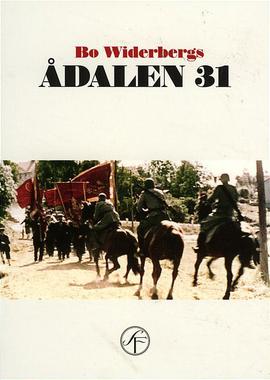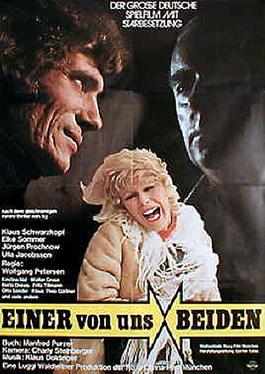New German Cinema is a period in German cinema which lasted from 1962 to 1982, in which a new generation of directors emerged who, working with low budgets, and influenced by the French New Wave and Italian Neorealism, gained notice by producing a number of "small" motion pictures that caught the attention of art house audiences. These filmmakers included Percy Adlon, Harun Farocki, Rainer Werner Fassbinder, Peter Fleischmann, Werner Herzog, Alexander Kluge, Ulli Lommel, Wolfgang Petersen, Volker Schlöndorff, Helma Sanders-Brahms, Werner Schroeter, Hans-Jürgen Syberberg, Margarethe von Trotta and Wim Wenders. As a result of the attention they garnered, they were able to create better-financed productions which were backed by the big US studios. However, most of these larger films were commercial failures and the movement was heavily dependent on subsidies. By 1977, 80% of a budget for a typical German film was ensured by a subsidy.

Ådalen 31 is a 1969 Swedish drama film directed by Bo Widerberg. It depicts the 1931 Ådalen shootings, in which Swedish military forces opened fire against labour demonstrators in the Swedish sawmill district of Ådalen killing five people, including a young girl.

Peter Fleischmann was a German film director, screenwriter and producer. He worked also as an actor, cutter, sound engineer, interviewer and speaker. Fleischmann belonged to the New German Cinema of the 1960s and 1970s. He is known for directing the 1969 Jagdszenen aus Niederbayern, but he produced films of many genres.

Robert Piet Houwer is a Dutch film producer. He studied at the University of Television and Film Munich, Germany. In 1964 he directed the short film Anmeldung (Declaration) which was awarded a Silver Bear at the Berlin Filmfest. During the 1960s, Rob Houwer became one of the most prolific producers in Germany, with directors Volker Schlöndorff, Peter Fleischmann, Johannes Schaaf (Tattoo), Michael Verhoeven and Hans-Jürgen Syberberg.

Antonio das Mortes is a 1969 Brazilian western film directed by Glauber Rocha. It is often cited as the last installment of Rocha's film trilogy, preceded by Black God, White Devil and Entranced Earth. It features return of the character Antonio das Mortes, now as the protagonist, again played by Maurício do Valle. The original title is a reference to the tale of Saint George and the Dragon.

Artists in the Big Top: Perplexed is a 1968 West German film written and directed by Alexander Kluge. The film is made in a collage style, featuring newsreels and quotations from philosophers alongside the story of a failing circus whose owner, Leni, must decide whether her dream of a new kind of circus is too optimistic. The film is a symbolic representation of Kluge's own frustrations in trying to help stimulate the New German Cinema movement.

Helmut Fischer was a popular, award-winning German actor.

The Captain from Köpenick is a 1956 West German comedy film directed by Helmut Käutner and based upon the 1931 play The Captain of Köpenick by Carl Zuckmayer. The play was based on the true story of Wilhelm Voigt, a German impostor who masqueraded as a Prussian military officer in 1906 and became famous as the Captain from Köpenick. It was nominated for the 29th Academy Awards in the category Best Foreign Language Film.

Moloch is a 1999 Russian biographical film, directed by Alexander Sokurov. The storyline was conceived from a screenplay written by Yuri Arabov and Marina Koreneva. It portrays Adolf Hitler living life in an unassuming manner during an abrupt journey to the Bavarian Alps. The film stars actors Leonid Mozgovoy, Yelena Rufanova, Vladimir Bogdanov, and Leonid Sokol in principal roles. Moloch explores companionship, intimacy and dictatorship.
Jagdszenen aus Niederbayern may refer to:

One or the Other of Us is a 1974 West German film directed by Wolfgang Petersen. It was Petersen's first theatrical feature film, and was based on the novel of the same name by Horst Bosetzky, published anonymously under his pseudonym -ky. The film is a psychological thriller and focuses on the intense conflict between a university professor and a blackmailer. The film features Klaus Schwarzkopf and Jürgen Prochnow as the two main characters and won two Bundesfilmpreise.

Faust is a 1960 West German theatrical film directed by Peter Gorski. It is based on Goethe's Faust (1808) and adapted from the theater production at the Deutsches Schauspielhaus in Hamburg. It stars Peter Gorski's adoptive father Gustaf Gründgens as Mephistopheles and Will Quadflieg as Faust, and was chosen as West Germany's official submission to the 33rd Academy Awards for Best Foreign Language Film, but did not receive a nomination. The film also won a Deutscher Filmpreis for an Outstanding Documentary or Cultural Film in 1961.

Angela Winkler is a German actress.
Jagdszenen aus Niederbayern is a 1965 German play by Martin Sperr. The play was adapted into a film of the same name in 1969.
Martin Sperr was a German dramatist and actor. He was born in Steinberg near Marklkofen and died in Landshut.

Ballad of Carl-Henning is a 1969 Danish comedy film written and directed by Sven and Lene Grønlykke. The film won a Bodil Award for Best Danish Film and Jesper Klein won the award for Best Actor in a Leading Role of 1969.
Palaver is a 1969 Belgian fantasy film directed by Emile Degelin. The film was entered into the 6th Moscow International Film Festival. The film was selected as the Belgian entry for the Best Foreign Language Film at the 42nd Academy Awards, but was not accepted as a nominee.

Two Lives is a 2012 German war drama film written and directed by Georg Maas, and starring Juliane Köhler, with Liv Ullmann. Set in Norway and Germany, it is loosely based on an unpublished novel by Hannelore Hippe since released as Ice Ages. The film explores the history of the Lebensborn or war children, born in Norway and raised in Germany. It explores the life of a grown woman who had claimed to have escaped from East Germany, where she was raised, and her Norwegian mother, with whom she is reunited.

Das Tagebuch der Anne Frank is a 2016 German drama film directed by German filmmaker Hans Steinbichler and written by Fred Breinersdorfer. It stars Lea van Acken as the titular character, Martina Gedeck, Ulrich Noethen, and Stella Kunkat. The film is based on Anne Frank's famous diary and tells the story of Anne Frank, the Jewish girl who went into hiding with her family in Amsterdam and became a victim of the Holocaust.

In the Fade is a 2017 German drama film written and directed by Fatih Akin. It stars Diane Kruger as a German woman whose Turkish-Kurdish husband and son are killed in a terrorist attack perpetrated by neo-Nazis. It was selected to compete for the Palme d'Or in the main competition section at the 2017 Cannes Film Festival, where Kruger won the Best Actress award. It was selected as the German entry for the Best Foreign Language Film at the 90th Academy Awards, making the December shortlist, but it was ultimately not nominated. It did, however, win the Golden Globe Award for Best Foreign Language Film.















